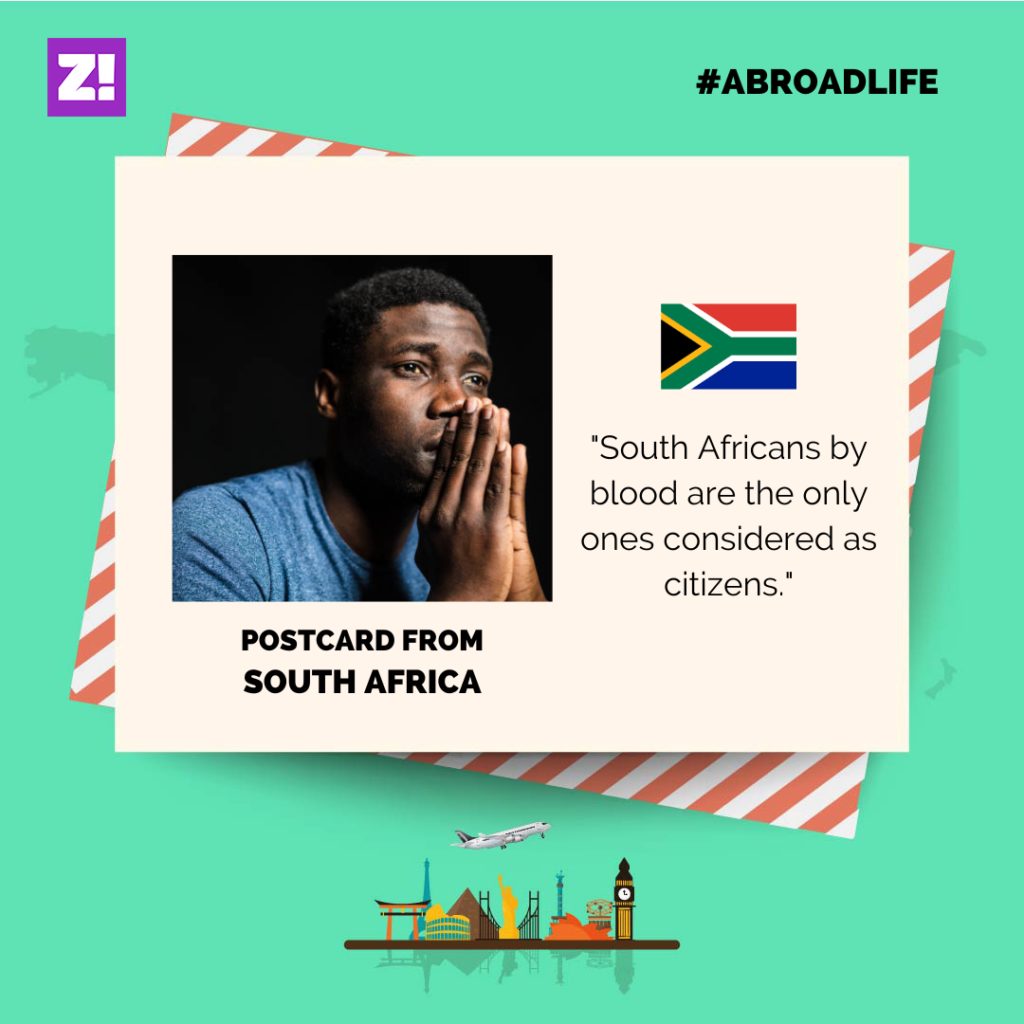The Nigerian experience is physical, emotional, and sometimes international. No one knows it better than our features on #TheAbroadLife, a series where we detail and explore Nigerian experiences while living abroad.

This week’s subject on Abroad Life is a recent graduate who has lived in Johannesburg since he was five years old. Over the years, he’s missed out on big opportunities because he’s not a native South African. He shares his South African xenophobia experience with me.
When did you decide to move abroad?
Well, I can’t say I decided. In 2003, I migrated to South Africa with my family at the young age of five. So I’ve spent almost my whole life here.
Do you have any memories of life in Nigeria?
I can vaguely remember growing up in Anambra. Life wasn’t great when it came to finances. The ground in our compound was red earth, and there was hardly any power. I also remember being constantly hungry. These memories tally with my parents’ reasons for leaving Nigeria — to secure a better life and be financially prosperous.
What was the relocation process like?
My dad had been in South Africa for ten years. He became a citizen through naturalisation, though he kept coming to Nigeria often to see his family in Nigeria. After the tenth year, he processed the necessary immigration papers for myself and my mum to move here as well. I got in through my dad’s citizenship, and I’ve gained mine through naturalisation too, as I’ve been here for more than ten years. I have two passports now.
Did you experience any culture shock?
In South Africa, there are so many cultures because people come in here from all over the world. That’s where South Africa gained the nickname “Rainbow Nation” from. I’ve visited Nigeria a couple of times since I left, and the difference in terms of respect is clear. You always have to attach “Ma” and “Sir” to everything, but not here in South Africa. No one cares about that.
Are there advantages to living in South Africa?
The quality of life is great here. You can still get the basics even if you’re struggling in South Africa, unlike Nigeria where even good roads are hard to find. It’s only recently we started having power outages, mostly because of the increased cost of power generation due to the COVID-19 pandemic.
Growing up here, I’ve assimilated well into society. I may not have been able to say this if I came here at a more mature age. And because of my citizenship, I have access to bursaries, scholarships, etc.
What would life have been like otherwise?
The cost of living is expensive. The school fees for public universities here is equivalent to what the best private universities in Nigeria charge. Most Nigerians need scholarships and two jobs to afford higher education in South Africa.
It’s also harder to make friends when you don’t have the typical South African accent, which I’ve developed.
Have you experienced any challenges?
I still experience a bit of xenophobia. I’ve lost opportunities because I’m not a native South African. Employers prioritise native South Africans over foreigners, especially blacks.
Can you give more context into your experience with xenophobia?
It has to be one of the worst things about South Africa. They want to reserve all the good opportunities for the native South Africans. South Africans by blood are the only ones truly considered citizens.
For example, Nigerians and Zimbabweans are targeted a lot. When they talk about foreigners here, they usually mean us. Most Nigerians here are self-employed and their businesses are doing well, and a lot of South Africans don’t like it. They try to hinder the growth of those businesses, either by looting the stores, protesting or claiming rights. A few years ago, South Africans burnt down many shops owned by Nigerians in the business district of Johannesburg. I know people in Nigeria retaliated by burning down Shoprite and all.
How has xenophobia affected you personally?
I’ve lost scholarships that would’ve advanced my professional football career, even though I had excellent grades when I graduated from university. I also didn’t scale an interview for an entry-level government job opportunity, even though I had all the qualifications. And everyone here knows that government jobs pay some good money.
Tell me about the interview you failed
I can’t really mention the name of the government sector, but it’s a huge sector in the country. They seemed highly impressed with my skills and qualifications, so I was asked where I’m from because of my surname. I said I grew up in South Africa, and my parents are Nigerian. After that question, the interview panel proceeded to end the interview.
I just knew that my parents being Nigerian was what formed their decision not to take me.
Would you ever come back to Nigeria?
I’m not sure I can ever come back to Nigeria. The amount of insecurity and inflation there is too much. There are better chances of a better life here in South Africa than Nigeria. Besides, I’m more South African than Nigerian in my attitude, culture and everything I do. The country is in my veins, and thus, I can never go back.




